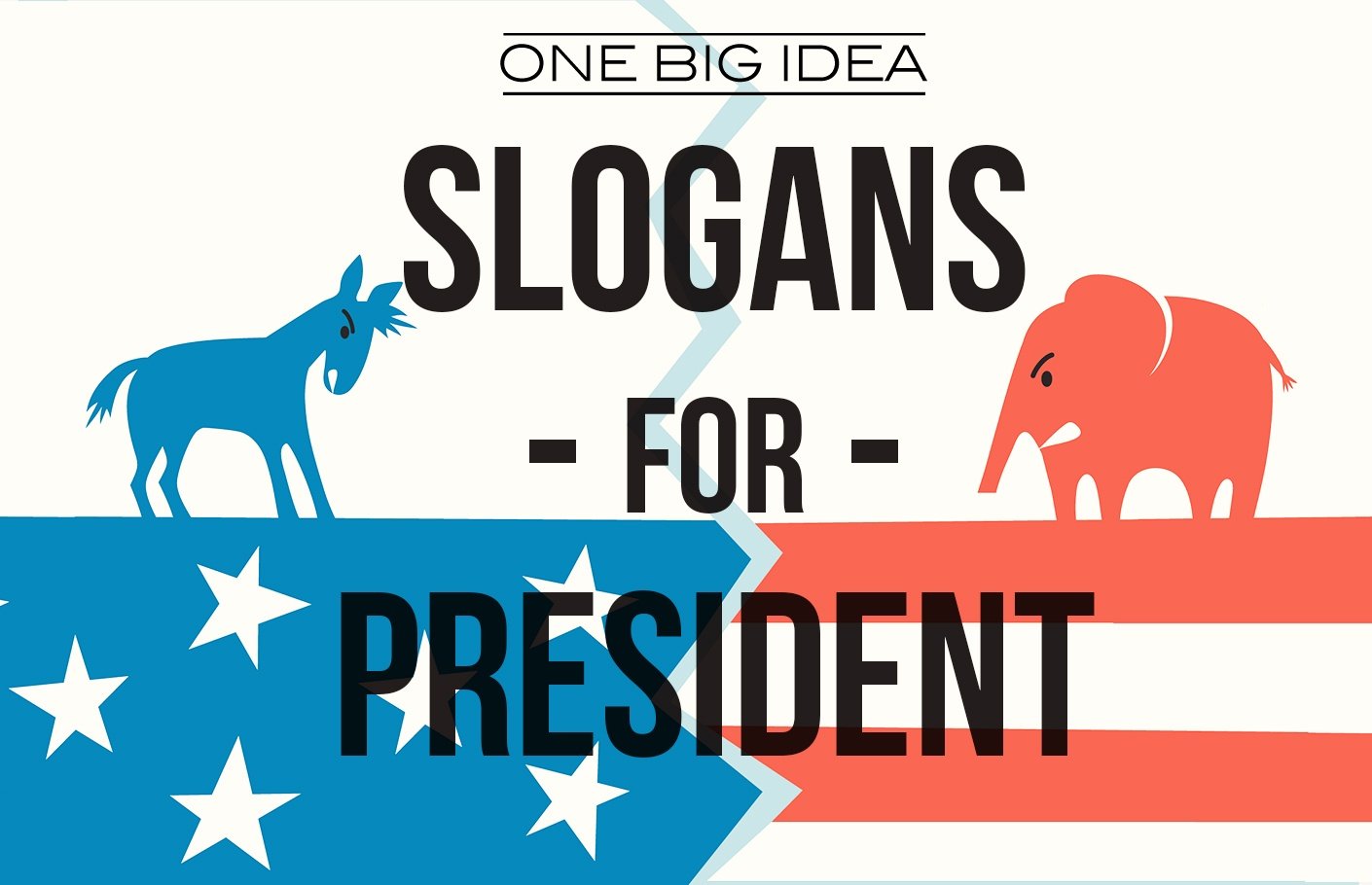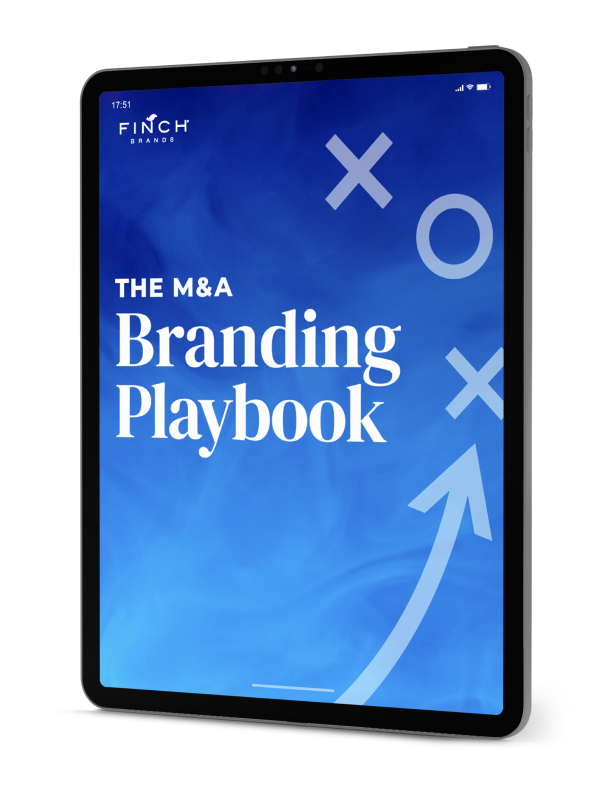One Big Idea: Slogans for President

With less than two weeks until election day in the US, we take a look at the role and effectiveness of campaign slogans across the years. With unique insight provided by the glimpse into the Clinton campaign and the road to the final slogan, we take a nonpartisan look at branding presidential candidates. If you like our podcast, please subscribe and leave us a rating!
Podcast: Play in new window | Download Subscribe: iTunes | RSSTranscription
Bill Gullan: Greetings one and all, this is Real-World Branding, I’m Bill Gullan, President of Finch Brands, a premiere boutique branding agency and this is One Big Idea. Here we are, less than two weeks away from election day in the U.S. and the presidential election and really important elections at all levels.
We’re here in Pennsylvania so we have a pretty close Senate race as well as a bunch of other things to really look forward to and everyone’s talking about it. Both the presidential campaign and all the way down. Unfortunately, or fortunately, depending on how one looks at it, it’s all going to be over in about two weeks we think, we’ll see if there’s any hanging chads but doubtful given where the polls look today.
We will do a postmortem after the election on the role of branding in the 2016 campaign. I was looking back at a previous episode of Real-World Branding that we recorded in I think it was May, it might have been March of 2015 during which we discussed with Matt Lewis, who’s a CNN commentator and political analyst the slogan and brand approaches of the candidates who had already declared at that time, so we did include Hillary.
That was pre-Trump, though, so we didn’t get too deeply into the approach that the Trump campaign was going to take. I’m not sure they knew at the time, but we talked about probably 10 or 11 different candidates and I can’t wait to look back and to listen to that again to see what we got right and what we got wrong.
One of the things that’s been really interesting about this election season is the glimpse into the Clinton campaign that has been provided through WikiLeaks. By whatever means they acquired these, and somewhat nefarious perhaps, but either way we’ve had really unprecedented access, a window into the decision making of senior staff, their frustrations, their exhalations, and everything in between.
One particular exchange that I’ve been interested in and been thinking about was a release of a list of I think 84 different slogans or taglines that have been presumably tested and considered for Hillary Clinton’s campaign. I think they were going through a relaunch at that point, one of many I guess. They were looking to really solidify the slogan that they were going to take through the end of the primary and into the general and I think there were 85 different options that had been put together by her polling firm and the senior staff was circulating this and they were scheduling a meeting to discuss it. So we can’t hear all the discussions in the meeting but we can certainly look through these different slogans and see where they were thinking and what their directions were.
What’s interesting about political slogans, and the role of slogans and brands on presidential campaigns, is that they do work similarly to that of our corporate clients – whether it’s products or companies and the way they think about taglines. We spoke a couple weeks ago about the possible uses of a tagline, when to have one, when not to have one, what are some great ones over history, what are some of the ingredients of a great tagline, but when it comes to great taglines or certainly political slogans, what you’re really looking for is the right joining of the person in the moment, or in the case of corporate clients, the company or product in the moment and the culture.
We’ve talked from among our clients a couple of taglines from the past that really we were very proud of or Join In, Geek Out for ThinkGeek that was really designed to suggest the roll of the company in bringing together geeks of various types and we all have the geek inside of us and let’s share and become part of this community and raise our hand and say this is what we value and also there was a moment, and is a moment in our culture where geekdom is being celebrated so that’s a tagline that, not only in terms of it’s cadence as effective, but it really does connect company and cultural moment.
Another one we were proud of is you got this for the Scucci brand of Conair and it was really drawing on confidence as a way of connecting with the modern, feminine creed today and connecting that to what Scucci products do and so those are taglines that we’re proud of. In part because they encapsulate the unique product attributes or corporate values of our client and the moment that’s occurring culturally.
I think the best political slogans are like that too. It’s that intersection of the candidate and what they stand for, both in terms of policy but also personal characteristics and the moment in the electorate. A lot of ink, or pixels, have been spent talking about the nature and the mood of the electorate this year, and that’s obviously been a really important factor in the rise of the Sanders candidacy and certainly the Trump candidacy and well beyond.
When we look at what the best slogans are or best taglines for candidates, they tend to be this organizing principle for a candidacy. They’re not too detailed, but they express the personality of the candidate as well as an overarching key theme that links together their policy proposals and their beliefs and all that they are and all that they want to do. It really is that intersection of how the electorate is feeling and what the person who’s running is promising to provide, and we look at a few of these over history, those that were particular effective were at the very least memorable.
Going back to 1984, Ronald Reagan running for reelection, ‘It’s Morning Again in America’ was a campaign slogan that really registered and has withstood the test of time. Reagan was appealing not only because America had come out of the economic malaise of the late 70s and had restored economic growth by 1984. Also a bit of a swagger and sense of pride and purpose and patriotism was back. It also connected to Reagan’s, and again whatever you think politically about all of these things, Reagan projected kind of the sunny, optimistic, idealized view of American patriotism and purpose and so Morning Again in America in 1984 was a really strong encapsulation of a man and a moment.
In 1988, when George Bush, we call him Senior, he’s not really Senior but when George Herbert Walker Bush ran for the presidency talking about a ‘Kinder, Gentler Nation,’ not only did that reference his personality, which in some ways was portrayed to his detriment, but that of being an experienced, gentle, almost courtly soul. While at the same time was suggesting that with the Cold War near its end, that America could begin to focus a little bit inward. Some of the soft underbelly of the Reagan years was some concern when it comes to poverty, when it came to AIDs, when it came to the more vulnerable in the U.S. This Kinder, Gentler Nation that George Bush was championing in 1988 stuck and became a really strong connector between the person and the political moment.
Then 2008, President Obama’s ‘Change We Can Believe In,’ ‘Hope’ and ‘Change,’ a lot of the words that were important currency for the Obama movement both in 2008 and in some ways in the present day. Change We Can Believe In was a slogan that encapsulated not only, what at that time after the financial crisis really in the throws of it and everything else, was a significant desire for a change in trajectory within the country, also fatigue certainly at the end of the Iraq War and the Afghan War and the 7 years after 9/11. This was all wearing thin. The electorate was craving change and Change We Can Believe In, in terms of President Obama, his unique talents and his characteristics, what he represented and what he brought forth into the electorate at that time. Change We Can Believe In is another example of a slogan that really stuck and was very apt for both the candidate and the moment.
Moving on to Hillary. The list that they provided has, let’s see 3, 6, 9 different buckets. They put these into categories. Actually it’s funny because we do this sometimes for clients too so it’s interesting to see how political consultants portray this. There are 9 different buckets and there’s like 84, 85 tagline options overall. One bucket is Fairness and Families. The next bucket is Fighter. The next bucket is Basic Bargain, Making America Work. The next is Strength. The next is Results, etc. etc. On the list, embedded within these 80 some options was the one that they eventually chose to move forward and that their using now which is ‘Stronger Together.’ The slogan of the Clinton campaign is ‘Strong Together.’
I think the question ought to be asked at this point, again regardless of ideology or policy or what happens two weeks from now is, was this the right choice? I guess you could say every choice was right if a candidate wins or every choice was wrong if they lose, but from a perspective of how we’ve defined slogans and their advocacy in terms of meeting the candidates unique characteristics and attributes and the moment within the electorate; is Stronger Together, a strong choice for the Clinton campaign?
One could argue that it represents the moment. Stronger Together speaks to multiculturalism and a focus that is very significant right now, an identity in how the American tapestry includes folks of various types, diversity, a lot about income inequality and what to do to make America’s playing field more level. A notion that the Clinton campaign represents about well chosen, collective government action. Stronger Together may represent, to a degree, the moment. At least some of the elements of the moment. I would argue, however, though that it maybe doesn’t represent the candidate as well as the most successful slogans do.
Hillary Clinton for all of her successes has never really been a unifying figure. She is thought to inspire great loyalty but also strong dislike among her political opponents. Several of the moments in which she faced the greatest amount of trouble in this campaign were when she called half of Trump’s supporters a ‘basket of deplorables’ when she said she was going to put coal miners out of business, when there was controversy over the use of her term ‘super predator’ when it came to the crime bill that the Clinton administration passed in the 90s. The moments of weakness for her have really not been about bringing people together, but separating and stigmatizing them.
However, her strength has always been, I would say and I think even Donald Trump said this when asked the question in I guess it was the second debate to say something nice about ones opponent. He suggested that she’s very persistent and that she fights. She doesn’t give up. When I think about the Hillary Clinton brand and what represents the candidate most effectively from that list of different buckets of taglines is the notion of a fighter.
When she thinks about this mission that she seeks to undertake on behalf of the middle class and other marginalized groups in the U.S. and to fight for families and fight for women and fight for equal opportunity for all, it seems that not only is that a helpful encapsulation of her energy and her animating spirit and her career, it also may go even a little bit further than Stronger Together towards the notion of a very restive electorate and the moment in which we find ourselves.
I would say, I don’t know if there was a better option when we go through the list, that Stronger Together, again though it may be attached to a candidate who rides all the way into the White House, maybe isn’t an example of a transcendent slogan that is just right for a moment and for a candidate that will be remembered long into history. I think in some ways it doesn’t reflect how most of us think about Secretary Clinton in terms of her career and her values, attributes, benefits, etc.
Now, that being said, we might as well look at the slogan of her primary opponent, her major party opponent, Donald Trump. I would argue, again, putting ideology and personality and everything else aside, we’re talking about branding here. That ‘Make America Great Again’ is a much stronger brand expression than Stronger Together.
We could argue as to whether or not we believe it or agree with it but, again, we talk about this meeting of candidate and moment. Let’s talk about the moment. We know, and the data suggests, that there are many, including Bernie Sanders supporters as well as Donald Trump supporters, as well as others who don’t think America really works well today. That it isn’t fair, that it’s rigged or whatever the word is – and I’m not talking about voting booths or ballot boxes but just the whole American system of government and economics.
Make America Great Again is a call to action to those who feel the America they knew has slipped away and the data suggests a lot of people feel like that. For some it hearkens back to a time of simpler values and greater confidence, a return to American confidence and purpose and focus.
Then when it comes to the candidate, Make America Great Again really connects in some ways to the man himself. Make is an active, doing, energetic word. It’s an imperative. As Trump fashions himself as a doer, a builder, an outsider, some have called him a ‘blue collar billionaire’ because even though he is, perhaps, part of the elite financially that he claims to revile and oppose this.
He really shows his insecurities and he’s very human and he cares a lot about status, and he cares a lot about a bunch of different things and he has a lot of concerns about his own place in the world. He’s very human in that way. I think Chris Matthews on MSNBC compared him to Frank Sinatra, as somebody who, again, obviously very financially successful but really wears his insecurities also in the case of Sinatra there were some shady dealings beneath the surface that were sort of made him rougeish, almost a little bit charming in a strange way, so I see that comparison to Trump.
Make American Great Again is polarizing, but I would argue that it’s polarizing because of the man, all that he has done and has said and all that he represents. There is an undercurrent that those who, there are many who don’t see the America he wants to go back to as a place we remember necessarily very fondly, certainly not by everybody and there are certain groups that find that whole notion of some sort of America restoration to be very off putting for understandable and powerful reasons, but just from a prospective of a slogan battle, this may bear out in two weeks, Trump’s in my opinion will be far longer remembered historically and is a better encapsulation of unique candidate attributes, as well as the electorate and the moment in time in which we find ourselves.
Anyway, WikiLeaks is giving us a fascinating looking into how candidates are packaged. There’s two weeks to election day. We’ll see what happens. We’d love to hear comments about your thinking about this. I don’t want to hear ideological comments or pitches on behalf of one candidate or another. This podcast is about branding and about the art and science of building strong brands and businesses and so to the degree that people want to weigh in on slogans, both through political history or this year, or taglines that they think are particularly powerful, we’d absolutely love to hear it and continue this dialogue moving forward on Real World Branding.
We will sign off from the Cradle of Liberty, happy fall.







